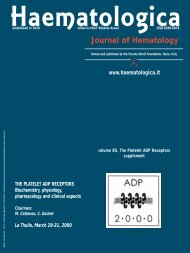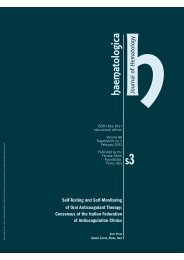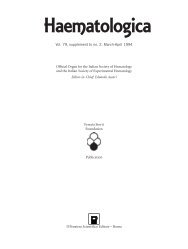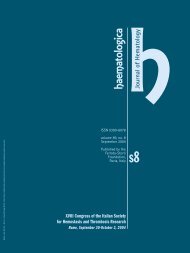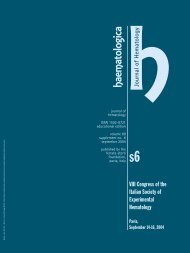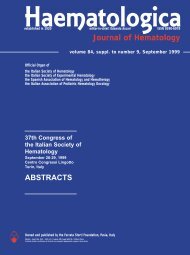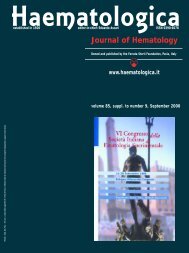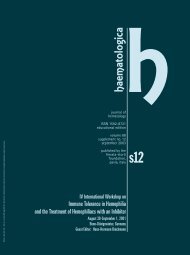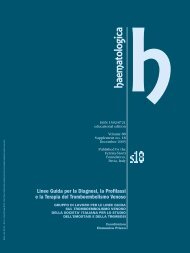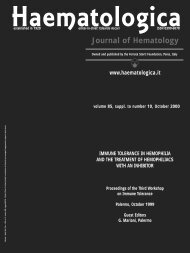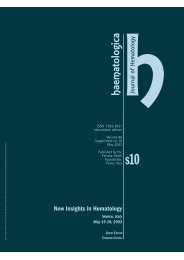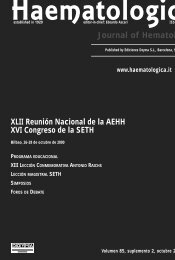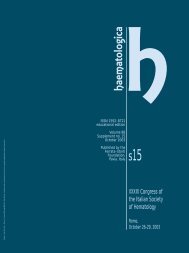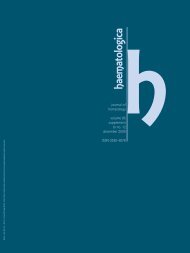Haematologica 2003 - Supplements
Haematologica 2003 - Supplements
Haematologica 2003 - Supplements
Create successful ePaper yourself
Turn your PDF publications into a flip-book with our unique Google optimized e-Paper software.
initial therapy. However, the role of HDT/SCT in the management<br />
of patients with MM is still a matter of controversy. A randomized<br />
trial by the French Intergroup showed that HDT significantly<br />
increased the complete remission (CR) rate, progression-free<br />
survival (PFS) and overall survival (OS) (4). More recently, the<br />
MRC VII trial showed a significant benefit for HDT/SCT versus<br />
conventional chemotherapy in both PFS and OS (5). In contrast with<br />
these results, Fermand et al (6) showed, in a prospective randomized<br />
trial, that HDT/SCT was not superior to conventional chemotherapy<br />
in patients aged 55 to 65 years.<br />
Aim: The objective of the present study was to compare HDT/SCT<br />
and continued conventional chemotherapy in MM patients<br />
responding to the initial treatment.<br />
Patients and Methods: From May 1994 to October 1999, 216<br />
patients (122M/94F), median age 56 yrs, stage II or III, ECOG < 3)<br />
were registered. The diagnosis was made according to the criteria of<br />
the Chronic Leukemia Myeloma Task Force. The initial<br />
chemotherapy consisted of 4 courses of alternating BVMCP/VBAD.<br />
Responding patients received either 8 additional courses of<br />
BVMCP/VBAD (arm A) or intensification with HDT/SCT -<br />
melphalan 140 mg/m 2 /TBI 12 Gys or melphalan 200 mg/m 2 (arm<br />
B). Maintenance treatment consisted of alpha-interferon and<br />
dexamethasone in both arms.<br />
Results: One-hundred and eighty five patients responded to initial<br />
chemotherapy (CR: 15%, PR: 68%, and MR: 17%). Twenty-one of<br />
these responding patients were not randomized due to different<br />
reasons. Among the 164 randomized patients 83 were allocated to<br />
continued chemotherapy and 81 to HDT/SCT. The degree of initial<br />
response as well as prognostic features did not differ in both groups.<br />
The results were updated as of November 15, 2002 after a median<br />
follow-up of 44 months from the initiation of treatment and<br />
analyzed on an intention-to-treat basis. CR (negative<br />
electrophoresis) was significantly higher in the HDT/SCT arm (30<br />
vs. 11%, p=0.002). However, PFS was not significantly different<br />
between HDT/SCT and conventional chemotherapy (median, 43 vs.<br />
34 mos; p=NS) and the OS was similar in both groups (median, 62<br />
vs. 56 mos.; p=NS).<br />
Conclusions: This study shows that, as delivered in this trial,<br />
HDT/SCT intensification significantly increases complete remission<br />
rate but has no significant impact on PFS and OS in myeloma<br />
patients responding to initial chemotherapy.<br />
References<br />
1. Crowley J, Jacobson J, Alexanian R. Standard-dose therapy for<br />
multiple myeloma. The Southwest Oncology Group experience.<br />
Semin Hematol 2001; 38: <strong>2003</strong>-2008.<br />
2. Bladé J, San Miguel JF, Fontanillas M, et al. Increased<br />
conventional chemotherapy does not improve survival in multiple<br />
myeloma: long-term results of two PETHEMA trials including 914<br />
patients. The Hematol J 2001; 2: 272-278.<br />
3. Hjorth M, Holmberg E, Rödjer S, et al. Survival in conventionally<br />
treated younger (2mg/dL<br />
(Table 1). With a median follow-up of 10 years for all patients,<br />
10-year survival and event-free survival rates were markedly<br />
higher with TT I than with SWOG SDT (33 vs 15%, p



